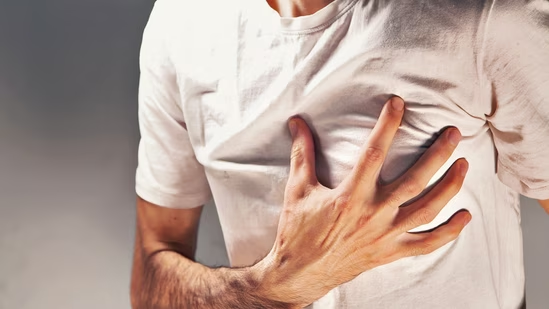Heart disease is often called a “silent killer” because its early symptoms can be subtle, easy to overlook, or mistaken for minor issues. But ignoring these warning signs can be dangerous. Every second counts when it comes to cardiovascular health, and early detection can significantly improve recovery and survival rates.
Dr. Bimal Chhajer, a leading cardiologist specializing in non-invasive cardiology, has identified 10 key symptoms of heart disease that people often dismiss until it’s too late. He shared these insights in his blog on Saaol.com, titled “Start Paying Attention to These 10 Signs of Heart Disease We Ignore”.
In this detailed guide, we’ll break down each symptom, explain why it happens, and discuss when to seek medical help.
1. Chest Discomfort – The Most Common Warning Sign
Chest pain, tightness, heaviness, or burning sensations are among the most recognized signs of heart problems. While it can occur during physical activity, it may also appear at rest. Some describe it as feeling like “a heavy weight on the chest,” while others experience sharp or squeezing pain. Women may even suffer heart attacks without chest pain at all, which makes awareness even more important.
When to act: If you experience unexplained or persistent chest discomfort—especially alongside sweating, nausea, or shortness of breath—seek emergency care immediately.
2. Nausea, Indigestion, or Stomach Pain
Although digestive issues are common, sudden or unexplained nausea, vomiting, or stomach discomfort can be a sign of a heart attack. Women are particularly prone to this symptom. The discomfort may feel like upper abdominal pain or severe heartburn.
Why it happens: Reduced blood flow to the heart during a heart attack can affect the digestive system, causing these sensations.
3. Pain Radiating to the Arm
This “classic” heart attack symptom usually affects the left arm, but in some cases, it may extend to both arms, the back, or even the neck. Occasionally, arm pain appears without chest pain, making it easy to misinterpret as a muscle or nerve issue.
Medical insight: This occurs when pain signals from the heart travel along shared nerve pathways to other parts of the body.
4. Dizziness or Lightheadedness
Feeling suddenly faint, unsteady, or dizzy—especially if it comes with chest pain or shortness of breath—can be a sign of heart trouble. This may indicate a drop in blood pressure because the heart isn’t pumping effectively.
Warning: Do not dismiss these episodes as fatigue or dehydration. If they happen repeatedly, get a cardiac evaluation.
5. Throat or Jaw Pain
While most throat or jaw pain is caused by sinus issues, infections, or muscle strain, pain that starts in the chest and spreads upward should raise a red flag. This can be a sign of reduced blood flow to the heart.
Tip: If jaw pain appears during physical activity and eases with rest, it could be heart-related.
6. Unusual Fatigue
If you feel drained after performing normal activities—like climbing stairs or walking short distances—it may indicate your heart is struggling to pump enough blood. Women are especially likely to experience fatigue as an early warning sign.
Clue: This fatigue often persists for days and isn’t relieved by rest.
7. Loud Snoring and Sleep Apnea
While mild snoring is common, excessively loud snoring—especially with gasping or choking sounds—can point to sleep apnea. This condition interrupts breathing during sleep, putting significant strain on the heart.
Why it matters: Untreated sleep apnea increases the risk of high blood pressure, stroke, and heart disease.
8. Persistent Cough
If you have a long-lasting cough producing pink or white mucus, it could be linked to heart failure. This happens when the heart can’t keep up with the body’s demands, causing fluid buildup in the lungs.
Note: While most coughs are not heart-related, those at risk for heart disease should take this symptom seriously.
9. Swollen Legs, Feet, or Ankles
Swelling in the lower body can signal poor blood circulation due to weakened heart pumping ability. This allows fluid to accumulate in tissues—a condition called edema.
Extra concern: Kidney function may also be affected, making swelling worse.
10. Irregular Heartbeat (Arrhythmia)
A racing, fluttering, or irregular heartbeat can occur occasionally without being dangerous. However, if it’s frequent or prolonged, it may indicate atrial fibrillation or other heart rhythm disorders.
When to check: If you feel palpitations along with dizziness, chest discomfort, or fainting spells, seek urgent medical advice.
Why These Signs Should Never Be Ignored
Heart disease symptoms vary from person to person. Some are dramatic, others subtle—but all deserve attention. Timely diagnosis and treatment can prevent serious complications like heart attacks, strokes, and heart failure.
Quick Heart Health Tips
-
Maintain a healthy diet rich in vegetables, fruits, and whole grains.
-
Exercise regularly, but consult your doctor before starting a new program.
-
Avoid smoking and limit alcohol consumption.
-
Manage stress through meditation, yoga, or breathing exercises.
-
Get regular heart checkups, especially if you have risk factors like diabetes, high blood pressure, or family history.
Disclaimer: This content is for informational purposes only. It is not a substitute for professional medical advice, diagnosis, or treatment. Always seek the advice of your physician with any questions about your health.
